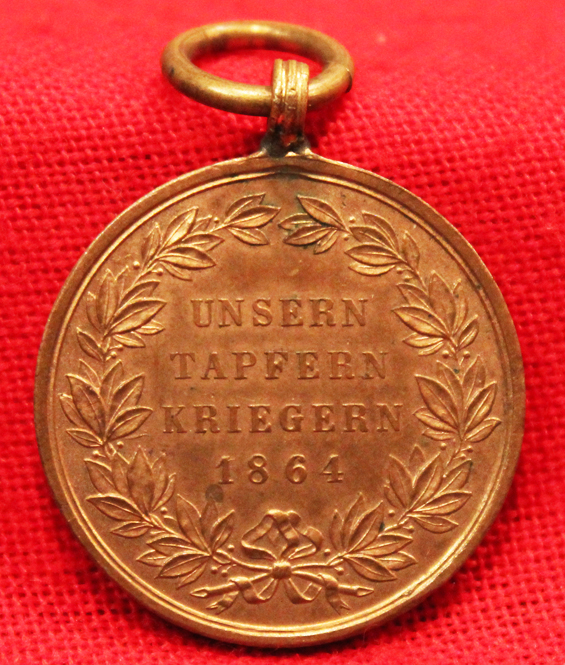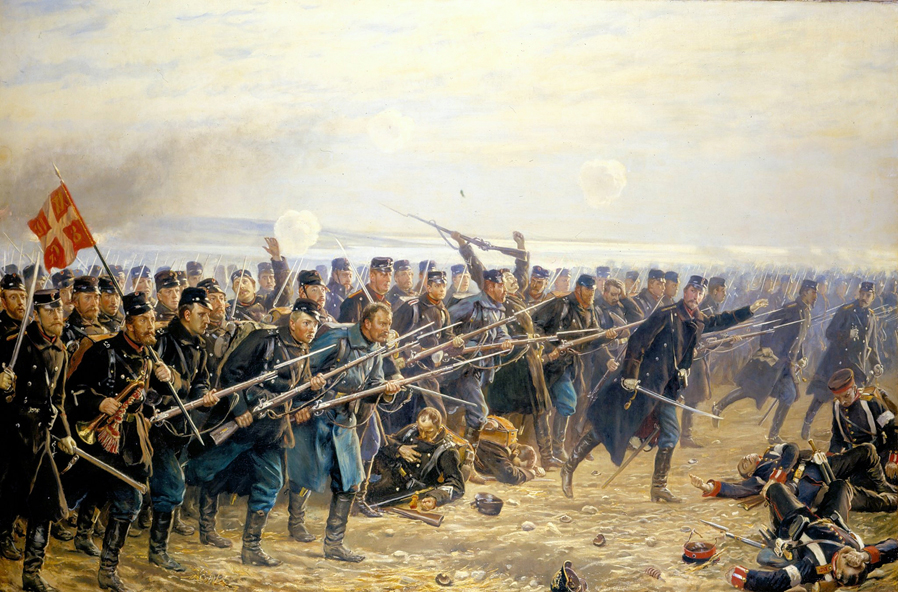Prussian Danish War Medal, 1864, Made From Captured Guns
Prussian, Denmark Campaign Medal. 1864 - Engraved Edge. Since the London accords of 1852 the duchies of Schleswig, Holstein and Lauenburg were attached by personal union to Denmark. Following the new constitution of 1863 Denmark integrated these areas into the state which caused a protest from the Deutsche Bund. After a resolution of the German Bundestag the German states send "Execution" troops into the duchies which belonged to the German Federation (Holstein and Lauenburg) under the command of Generalleutnant Heinrich von Hake formed by a Saxon brigade under Generalmajor von Schimpff as the operational-force, a Hanoverian brigade under Generalleutnant Gebser as a supporting force and a Prussian and an Austrian brigade in reserve. The Austrians took part in this Bundesexekutionscorps by sending a brigade under the command of Generalmajor Leopold Graf Gondrecourt. But in addition to this, the two German major powers, Prussia and Austria, decided to declare war on Denmark and sent an army consisting of three corps under the command of the Prussian Feldmarschall Friedrich Graf Wrangel, whose Chief of the General staff was Generalleutnant Eduard Vogel von Falkenstein. The 1st corps was commanded by the Prussian Prince Friedrich Karl, the 2nd corps by Feldmarschall-Leutnant Ludwig Freiherr von Gablenz and the 3rd corps by Generalleutnant von der M?lbe. The 2nd (Austrian) corps was formed by the 6th army corps, enlarged by a cavalry brigade and 2 heavy batteries. Additionally Graf Gondrecourt's brigade also joined the 2nd corps after leaving the surprised federal troops. On the 1st of February 1864 58,000 Prussian and 21.000 Austrian soldiers crossed the Eider and commenced operations against the Danish land forces. On the 2nd and 6th of February the Austrians were victorious at Vejle and Oeversee whilst the Prussians were successful at the D?ppeler Schanzen near Sondersburg on the 18th of April 1864. On the 9th of May a naval squadron commanded by Contre-Admiral Wilhelm von Tegetthoff successfully engaged superior Danish forces near the island of Helgoland. The Danish forces retreated to Northern J?tland and the islands of Alsen and F?nen and an armistice for 6 weeks was agreed for a new peace treaty of London. After the failure of these negotiations the hostilities again resumed on the 25th of June 1864 and the Austrian forces reached the Northern part of J?tland and finally Cape Skagen. The Danish Captain Hammer, who had caused the most trouble for the Austro-Prussian naval forces was captured between the islands of F?hr and Sylt and a new armistice was implemented on the 20th of July 1864 which finally lead to the peace agreement of Vienna on the 30th of October 1864. Denmark was forced to hand over the contested duchies to Prussia and Austria. However disagreement over the administration of these duchies soon became one of the primary reasons, especially promoted by the Prussian prime minister Otto von Bismarck, for the coming conflict between the two German major powers in the war of 1866. Franz Joseph I, Kaiser of Austria, and Wilhelm I, King of Prussia, agreed to institute a commemorative medal for their successful army. The great number of captured guns, especially from the fortress of Frederica, made it possible to decide that the medals should be minted from the brass of the enemy's guns. Kaiser Franz Joseph signed the institution of the medal on the 10th of November 1864 and the regulations (Statuten) dated the 11th of November and both were published in the Armeeverordnungsblatt on the 20th of November 1864. The official name was: "Erinnerungs-Medaille an den Feldzug 1864 gegen D?nemark" (commemorative medal for the 1864 campaign against Denmark) Along the rim of the medal the words: "AUS EROBERTEM GESCHUETZ" (from captured guns)
Code: 19933
85.00 GBP





